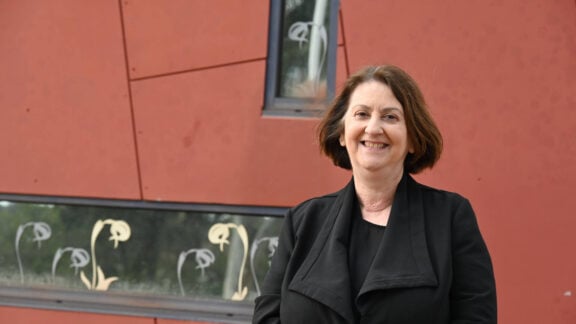Slightly tanned, a bit jet-lagged, a lot excited, Victoria Haralabidou flew in from Greece (where she was vacationing) to Melbourne, in order to participate in a ‘very thrilling’ project that she’s not at liberty to discuss, no matter how hard I beg. One of the reasons she’s happy is that she is working with a lot of people who were also part of Barracuda, the TV adaptation of Christos Tsiolkas’ novel currently being broadcast on the ABC.
The show – and the book – narrates the struggle of a talented young Greek Australian swimmer from a working class background who attends a prestigious Melbourne private school on a sporting scholarship. Victoria plays his mother.
“I had read the book, before I learned that they were turning it into a series,” she says.
“I’ve read all of Christos Tsiolkas’ books, we don’t have a lot like him in our community, so we should read what he writes. Especially in my line of work, I need to have as much insight as I can and his books help you realise what’s going on in this society. I don’t like all of his works, but I related to a lot of things in this book. So, when I learned that they were making a Barracuda series, I knew there’s a part that is perfect for me”, saying that she immediately related to the character’s love for her son, “the kind of love that knows no boundaries”, something that she herself feels for her six-year-old boy.
“So I called the director, Robert Connolly, with whom I had worked in the past and told him that they can cast all parts as they like, but this one is mine,” she says, and bursts into laughter.
“Okay, but you still have to audition,” replied the director. She did and she got the part, earning praise from different sources.
“The most flattering comment that I received came from an Italian woman, a viewer, who wrote that she woke up at night thinking that the only person she can relate to is the one I play in the series”.
To me, that’s the highest praise you can get. Victoria shares the same sentiment as this unknown woman.
“There are no Greek women in Australian television,” she says.
“There were a couple of guys in The Slap (ABC’s adaptation of another Tsiolkas novel), but no complex women of my age and background, no one I can identify with. Although a lot of Australian shows have pushed the boundaries and have engaged in an open dialogue in society, either about sexuality, or ethnicity and culture. This is important because if you cannot relate to the people you see on TV you feel left out, you’re not represented. This happens to women who are from my age group, or my culture, to people of other cultures, to indigenous and so on,” she says, acknowledging that a lot has changed in Australian culture in the 12 years that she’s been living here, since she decided to follow her Australian Greek husband to his homeland.
“I found myself in a totally new country, in which I was a complete stranger and had to start from scratch, from zero,” she says.
“This is a huge slap to your ego, but it’s good, because we actors are very arrogant, we think we’re irreplaceable. But I’m lucky, because – even though I’m ambitious – there’s more to my life than work. This is why I started a family here, it makes my life richer. I love my family, I love my life, I love good food, wine and music, my personal time and space. Australia gave me the opportunity to have it all. In Greece I was always under pressure to prove something – it’s part of the culture there.”

I ask her about her recent vacation – how did she see Greece? She talks of a community torn, in which people are ready to jump down one another’s throats, “something that has always been there, but now they’re constantly on edge”, and describes witnessing two people engaged in a fight on the beach, much to the horror of her son.
Anyway, back to Australia. “Here people give you more space to grow. I can do things that are more challenging to me and under more professional and respectful circumstances,” she says.
And now she’s managed to be part of a show that actually portrays what it is like for someone like her to be part of the country and cope with the daily challenges.
“Many important and interesting projects have been broadcast, depicting what’s happening in the broader community. This shows courage and makes me happy, but I’ve yet to see someone like myself on TV. I’m still waiting. I’m waiting for a dark comedy,” she says.
“I’ve had enough of drama”.
If this dark comedy doesn’t come soon enough, she might have to create it herself. After all, she’s halfway there, as can be attested by her social media followers who enjoy her short, absurdist videos, in which she shares her pearls of wisdom under the moniker of ‘Frida’, modelled after the iconic Mexican artist Frida Kahlo.
“It came organically,” she explains. “I was toying around with an editing app for mobile phones that a friend has developed and I started talking as this character.”
Would she consider turning it into a regular web series?
“If the right gang came along, why not?”








